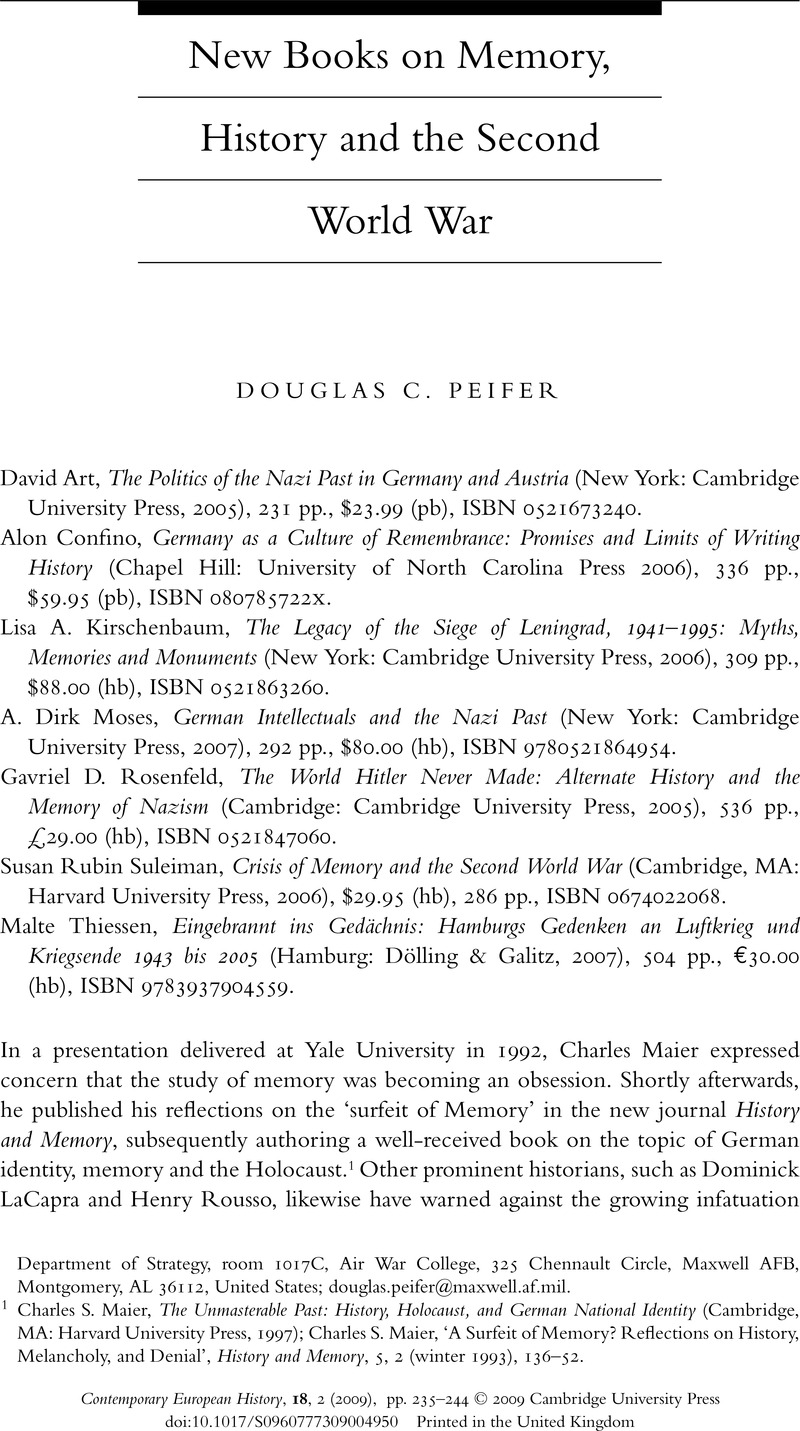Published online by Cambridge University Press: 01 May 2009

1 Maier, Charles S., The Unmasterable Past: History, Holocaust, and German National Identity (Cambridge, MA: Harvard University Press, 1997)Google Scholar; Maier, Charles S., ‘A Surfeit of Memory? Reflections on History, Melancholy, and Denial’, History and Memory, 5, 2 (winter 1993), 136–52Google Scholar.
2 LaCapra, Dominick, History and Memory after Auschwitz (Ithaca, NY: Cornell University Press, 1998)Google Scholar; Rousso, Henry, The Vichy Syndrome: History and Memory in France since 1944 (Cambridge, MA: Harvard University Press, 1991)Google Scholar.
3 H-Memory, www.h-net.org/~memory/ (last visited 30 December 2008).
4 Book reviews abound on the topic. For some of the more recent review essays and articles on memory regimes, see Hampton, Mary and Peifer, Douglas, ‘History, Memory, and International Relations: Breaking Taboos in the Berlin Republic’, German Studies Review, 30, 2 (2007), 371Google Scholar; Dejung, Christof, ‘A Past that Refuses to Pass: The Commemoration of the Second World War and the Holocaust’, Journal of Contemporary History, 43, 4 (2008), 701CrossRefGoogle Scholar; Nolan, Mary, ‘Air Wars, Memory Wars’, Central European History, 38, 1 (2005), 7–40CrossRefGoogle Scholar; Judt, Tony, ‘From the House of the Dead: On Modern European Memory’, New York Review of Books, 52, 15 (2005), 12–16Google Scholar; Confino, Alon, ‘Telling about Germany: Narratives of Memory and Culture’, Journal of Modern History, 76, 2 (2004), 389–416CrossRefGoogle Scholar; Langenbacher, Eric, ‘Changing Memory Regimes in Contemporary Germany?’, German Politics and Society, 21, 67 (2003), 46–68CrossRefGoogle Scholar; Cole, Tim, ‘Review Article: Scales of Memory, Layers of Memory: Recent Works on Memories of the Second World War and the Holocaust’, Journal of Contemporary History, 37, 1 (2002), 129–38CrossRefGoogle Scholar; Schüler-Springorum, Stefanie, ‘Perspectives on War in the Twentieth Century’, Contemporary European History, 17, 4 (2008), 567–73CrossRefGoogle Scholar.
5 Maier, ‘Surfeit of Memory?’, 150–1.
6 Nora, Pierre and Kritzman, Lawrence D., eds., Realms of Memory: Rethinking the French Past, European Perspectives (New York: Columbia University Press, 1996)Google Scholar.
7 Herf, Jeffrey, Divided Memory: The Nazi Past in the Two Germanys (Cambridge, MA: Harvard University Press, 1997)Google Scholar.
8 Moeller, Robert G., War Stories: The Search for a Usable Past in the Federal Republic of Germany (Berkeley: University of California Press, 2001)Google Scholar.
9 Assmann, Aleida and Frevert, Ute, Geschichtsvergessenheit – Geschichtsversessenheit. Vom Umgang mit deutschen Vergangenheiten nach 1945 (Stuttgart: Deutsche Verlags-Anstalt, 1999)Google Scholar; Confino, Alon and Fritzsche, Peter, The Work of Memory: New Directions in the Study of German Society and Culture (Urbana: University of Illinois Press, 2002)Google Scholar; Jarausch, Konrad H. and Geyer, Michael, Shattered Past: Reconstructing German Histories (Princeton: Princeton University Press, 2003)Google Scholar; Bartov, Omer, Mirrors of Destruction: War, Genocide, and Modern Identity (Oxford: Oxford University Press, 2000)Google Scholar.
10 Suleiman, Susan Rubin, Subversive Intent: Gender, Politics, and the Avant-Garde (Cambridge, MA: Harvard University Press, 1990)Google Scholar, eadem, ‘War Memories: On Autobiographical Reading’, New Literary History, 24, 3 (1993), 563; eadem, Budapest Diary: In Search of the Motherbook (Lincoln, NE: University of Nebraska Press, 1996).
11 Confino, Alon, The Nation as a Local Metaphor: Württemberg, Imperial Germany, and National Memory, 1871–1918 (Chapel Hill: University of North Carolina Press, 1997)Google Scholar; Confino, Alon, ‘Edgar Reitz's Heimat and German Nationhood: Film, Memory, and Understandings of the Past’, German History, 16, 2 (1998), 185–208CrossRefGoogle Scholar; idem, ‘Telling about Germany’, Confino and Fritzsche, Work of Memory
12 Assmann, Jan and Hölscher, Tonio, Kultur und Gedächtnis (Frankfurt am Main: Suhrkamp, 1988)Google Scholar; Halbwachs, Maurice, The Collective Memory (New York: Harper & Row, 1980)Google Scholar; Nora, Pierre, Les lieux de mémoire (Paris: Gallimard, 1984)Google Scholar; Young, James Edward, The Texture of Memory: Holocaust Memorials and Meaning (New Haven: Yale University Press, 1993)Google Scholar.
13 For a fuller discussion of the book see my H-German review of Eingebrannt ins Gedächtnis: Hamburgs Gedenken an Luftkrieg und Kriegsende 1943 bis 2005, www.h-net.org/reviews/showrev.php?id=22910 (last visited 30 Dec. 2008).
14 Rosenfeld, Gavriel D., ‘Remembering the Holocaust in Germany, 1945–2000: German Strategies and Jewish Responses’, Holocaust and Genocide Studies, 17, 3 (2003), 498CrossRefGoogle Scholar; idem, Thinking About the Holocaust: After Half a Century (Bloomington: Indiana University Press, 1997); Rosenfeld, Gavriel D., ‘A Mastered Past? Prussia in Postwar German Memory’, German History, 22, 4 (2004), 505–35CrossRefGoogle Scholar.